Samsung Galaxy S7 vs S7 Edge: What’s the difference?
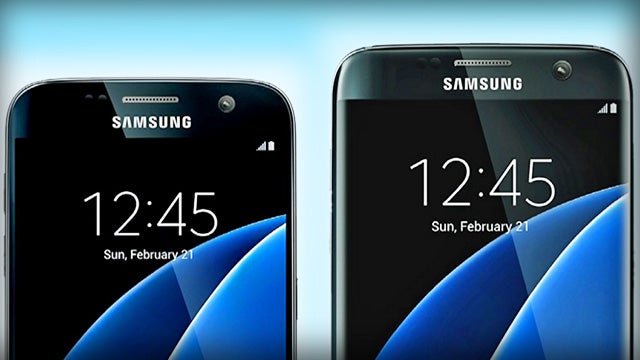
Samsung Galaxy S7 vs Samsung Galaxy S7 Edge – Which one is right for you?
Samsung’s latest duo of flagship smartphones, the Galaxy S7 and S7 Edge, are finally hitting store shelves after their flashy announcements last month. Between them, they provide a fine array of options for those who have a little extra money to spend on their next phone.
While they appear to be a subtle evolution of the Samsung Galaxy S6 and Galaxy S6 Edge, Samsung has worked a little harder to differentiate its latest phones.
These are no longer simply set apart by some curvy sides, but by a number of interesting factors.
Register for Galaxy S9 with Mobiles.co.uk and Carphone Warehouse to find out more about the release
Let’s take a look at what sets the two phones apart, and what they have in common.
Related: Amazon Prime Day 2019
Watch: S7 vs S7 Edge – What’s the difference?
Samsung Galaxy S7 vs S7 Edge: Design
Samsung Galaxy S7: 7.9mm thick, 152g, metal alloy, glass front and back, IP68 certified, Black/Gold
Samsung Galaxy S7 Edge: 7.7mm thick, 157g, metal alloy, 3D thermoformed dual-curved display, glass front and back, IP68 certified, Black/Gold
Samsung has continued with the design language of the Samsung Galaxy S6 and Samsung Galaxy S6 Edge for the two follow-ups. That means they’re both beautiful phones with finely sculpted metal rims and smooth glass rear covers.
Speaking of the back, Samsung has rounded out the rear of both of these devices, making them more balanced and more comfortable to hold. It also means that the camera lens doesn’t stick out quite so much.
This year the Samsung Galaxy S7 Edge is actually a bigger device than the Galaxy S7, but not by as much as you might think. It’s slightly taller and wider, and it’s a mere 5g heavier. However, the Galaxy S7 is actually 2mm thicker.
Clearly, the biggest difference between the Galaxy S7 and S7 Edge are those curvy sides. The Edges, as Samsung likes to call them, are not only gorgeous to look at, but they hold some nifty little features too.
Related: iPhone 6S vs Samsung Galaxy S7
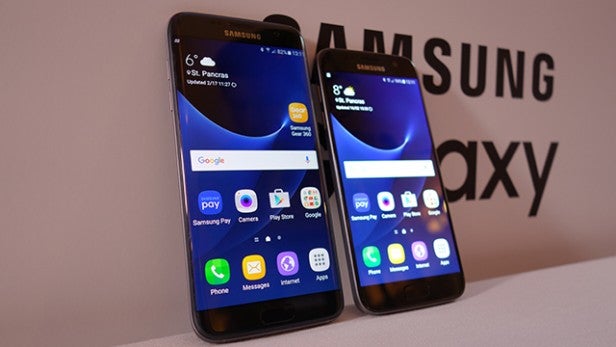
You can swipe in to access your favourite contacts, place frequently used apps and shortcuts, but now Samsung has added third-party app support so developers can build their own panels for the Edge UX.
For instance, Yahoo has built both a news and sports app that’ll show all the latest goings on, football scores and the like.
Still, the Edge sides are much more about the style than substance, but we can take that when they look this good. They definitely give the Galaxy 7 Edge the, er, Edge over the plain S7 in the looks department.
Related: Best Samsung Galaxy S7 Edge deals
Samsung Galaxy S7 vs S7 Edge: Screen
Samsung Galaxy S7: 5.1-inch Super AMOLED, 2,560 x 1,440, 577 ppi
Samsung Galaxy S7 Edge: 5.5-inch Super AMOLED, 2,560 x 1,440, 534 ppi
Here’s the reason for the Galaxy S7 Edge being a little bigger than the Galaxy S7.
Unlike last year, Samsung has decided to differentiate its two flagship Galaxy phones a bit more. So while it’s kept the screen size on the S7 to 5.1-inches, it’s upped the S7 Edge to an iPhone 6S Plus-like 5.5-inches.
Related: Samsung Galaxy S7 vs S6
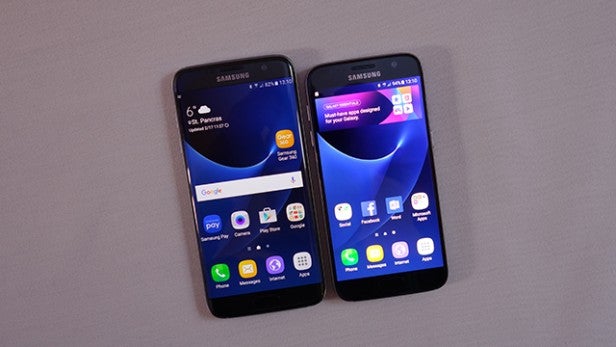
The resolution on the two is the same, though. Both are quad-HD, so the smaller S7 actually has a more pixel-dense panel. Still, both displays are stunners – with bright, vivid and accurate colours. Even though they’re Super AMOLED they don’t suffer from over-saturation, thanks to Samsung’s vastly improved technology.
The S7 Edge does have a few screen issues though. The sides are prone to strong reflections and there’s an ever so slight blue tinge when you’re looking at apps with white backgrounds. It’s a small issue, but it’s hard to unsee once you spot it.
Considering the S7 Edge has a screen the same size as that of the iPhone 6S Plus, it’s impressive how small and compact Samsung has managed to keep the phone. To be honest, when we first picked it up we thought the screen was much smaller than it was.
Samsung Galaxy S7 vs S7 Edge: Power
Samsung Galaxy S7: Exynos 8890 octa-core/Snapdragon 820 quad-core CPU, Adreno 530/Mali-T880 MP12 GPU, 4GB RAM
Samsung Galaxy S7 Edge: Exynos 8890 octa-core/Snapdragon 820 quad-core CPU, Adreno 530/Mali-T880 MP12 GPU, 4GB RAM
After going all-in with its own Exynos chip last year, Samsung has returned to a split CPU offering in the Samsung Galaxy S7 and S7 Edge.
Most territories – including the UK – are getting the new Exynos 8880, while the US is getting the Snapdragon 820. It’s an LTE thing, apparently.
Related: Note 7 – Everything you need to know
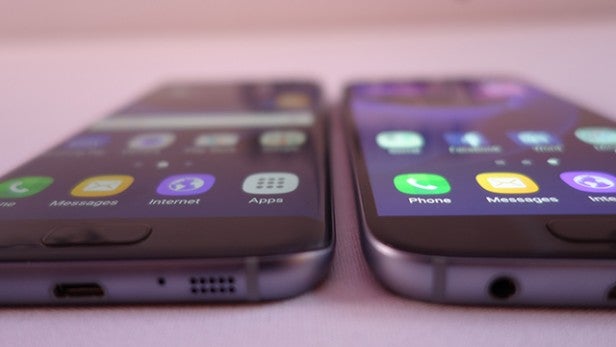
In real life usage, both are plenty fast, with a good 30 percent boost in CPU performance and 64 percent in GPU performance over the Exynos 7. The Exynos 88890 seems to have the edge when it comes to multicore benchmarks, while the Snapdragon 820 has the single-core bragging rights.
In GeekBench 3, the S7 picks up a multicore score of 6,307 and the S7 Edge 6,669. Single core scores are 2,100 and 2,197 respectively. In AnTuTu, they both score 128,468. This testing was done with the Exynos 8890 version.
The important thing to note is that both phones share the exact same CPU and 4GB of RAM, and both are among the fastest phones available today.
In fact, the only thing that really ever stutters here is the odd app and UI element, and that’s down to Samsung’s heavy-handed TouchWiz UI. But both of these phones have the exact same issue here, so there’s no comparison to be made.
Related: Best Samsung S7 deals
Samsung Galaxy S7 vs S7 Edge: Camera
Samsung Galaxy S7: 12-megapixel, phase detection, Dual Pixels, OIS, f/1.7 lens, 1/2.6″ sensor, 1.4 µm pixel, 4K video, 5-megapixel front camera
Samsung Galaxy S7 Edge: 12-megapixel, phase detection, Dual Pixels, OIS, f/1.7 lens, 1/2.6″ sensor, 1.4 µm pixel, 4K video, 5-megapixel front camera
Again, the cameras offered in these two phones are absolutely identical. Do you hear that, Apple? No annoyingly dropped OIS for the smaller model here.
Samsung has pared back the pixel count from 16-megapixels to 12-megapixels for the Galaxy S7 and Galaxy S7 Edge cameras, but the sensor itself is the same size as before – 1/2.6″. This allows the pixels to be larger – a pretty hefty 1.4 µm.
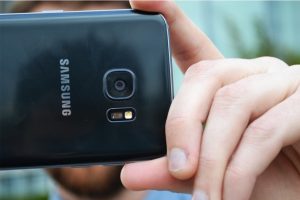
Bigger pixels means more light and better low-light performance – something that’s assisted by a bright f/1.7 lens.
Both cameras also benefit from Dual Pixel technology, which means that autofocus is among the fastest of any smartphone.
Again, both cameras identical, which means that both take some of the best pictures of any phone.
Check out some of the sample images captured with the two devices below.
Related: iPhone 6S Plus vs S7 Edge
 Pictures are packed with detail
Pictures are packed with detail
 The cameras perform great in low light
The cameras perform great in low light
 It’s perfect for landscape shots
It’s perfect for landscape shots
Samsung Galaxy S7 vs S7 Edge: Battery
Samsung Galaxy S7: 3000 mAh, wireless charging (Qi & PMA)
Samsung Galaxy S7 Edge: 3600 mAh, wireless charging (Qi & PMA)
While the S6 and S6 Edge were almost universally praised last year, one area that didn’t impress was the battery. Thankfully, Samsung has done things in that department a lot better this time around.
Both the S7 and S7 Edge have much improved batteries, but owing to the Edge being a larger phone it has more space for an ever bigger cell. In our experience, The 3,600 mAh battery in the Edge will easily get you through a day of moderate to high usage with 25-35% left, while the 3,000 mAh version on the S7 was left with 10-15% in the tank.
So, if you want the better performing battery then you should certainly go with the S7 Edge.
Both devices are equipped with adaptive fast charging tech, plus they’ll juice up on any Qi or PMA wireless pad.
Read also: iPhone 7 latest news
Verdict
Both of these phones are among the best that Android has to offer, and they share a number of core components and features.
While the Samsung Galaxy S7 Edge is the more eye-catching and long-lasting, however, we’d give the slightest of edges to the Samsung Galaxy S7.
It’s simply a more usable phone on a day to day basis, thanks to its slightly more manageable display. We also found the Galaxy S7 Edge’s curve display to be more of a gimmicky distraction than a killer feature.
If you are the heaviest of power users, or you tend to watch an inordinate amount of video content on your phone, then the Galaxy S7 Edge might be the best bet. For most people, though, the Galaxy S7 is the one to opt for.
(apester:56ca1e508f0287d70a577cb1)
Would you be more likely to pick the S7 or S7 Edge? Let us know in the comments below


